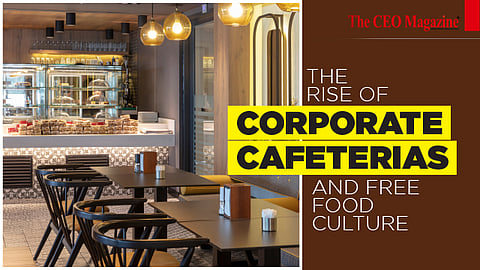
- News
- Women
- Magazine
- IndustryIndustry
- InsightsInsights
- Success Stories
- PublishPublish
- ContactContact
- Media KitMedia Kit

The Rise of Corporate Cafeterias and Free Food Culture
In today’s competitive business environment, attracting and retaining top talent goes beyond offering competitive salaries and benefits. Companies are increasingly recognising that the workplace experience plays a crucial role in employee satisfaction and productivity. One significant trend that has emerged is the proliferation of corporate cafeterias and the culture of providing free food. This shift not only enhances the work environment but also reflects broader changes in corporate culture and employee expectations.
Corporate cafeterias have evolved from simple dining areas into dynamic spaces that contribute significantly to the overall employee experience. Large companies are investing in high-quality cafeterias as part of their strategy to create a more engaging and supportive work environment. Here’s why corporate cafeterias are gaining traction and how they are influencing company culture.
One of the primary reasons companies are investing in corporate cafeterias is to promote employee well-being. Offering nutritious and diverse food options helps employees maintain a healthy lifestyle, which can lead to improved focus, energy levels, and overall job satisfaction. Companies are increasingly providing meals that cater to various dietary needs, including vegetarian, vegan, gluten-free, and low-calorie options.
Moreover, the availability of free or subsidised meals reduces the stress of meal planning and grocery shopping, allowing employees to focus more on their work. This contributes to a healthier work-life balance and demonstrates that the company values the health and well-being of its employees.
Corporate cafeterias are becoming more than just places to eat—they are designed to be social hubs that foster collaboration and communication among employees. Modern cafeterias often feature open and comfortable seating arrangements, including communal tables and lounge areas that encourage interaction.
By providing a casual space for employees to gather, companies are facilitating spontaneous conversations and idea exchanges that can lead to increased creativity and teamwork. The informal setting of a cafeteria can break down hierarchical barriers and promote a sense of community within the organisation.
In the competitive job market, offering attractive perks can set a company apart from its competitors. Free food is increasingly seen as a desirable benefit that can make a company more appealing to potential hires. For current employees, the availability of free or subsidised meals can enhance job satisfaction and loyalty.
Many large companies, particularly those in the tech industry, have embraced the free food culture as part of their overall employee benefits package. By offering high-quality meals and snacks, companies can create a more enjoyable and engaging workplace, which helps in retaining top talent and reducing turnover.
Corporate cafeterias can also serve as a reflection of a company’s culture and values. The design and offerings of a cafeteria often align with the broader goals of the organisation, such as sustainability, diversity, and wellness. For instance, companies that prioritise sustainability may use eco-friendly packaging, source local ingredients, and implement waste reduction programs.
Additionally, the cafeteria can be a space where companies promote their values and initiatives. For example, some companies use their cafeterias to highlight healthy eating habits, support mental health, or celebrate cultural diversity through themed food events.
The concept of work-life integration, rather than just work-life balance, is gaining prominence. Corporate cafeterias support this idea by creating a more fluid transition between work and personal life. By providing meals on-site, companies reduce the need for employees to leave the office for lunch, allowing them to make the most of their workday.
This convenience contributes to a more seamless work experience and helps employees manage their time more effectively. In turn, this can lead to increased productivity and a more positive overall work experience.
The free food culture within corporate cafeterias is not just about providing meals—it’s about creating a supportive and engaging work environment. Here’s how this trend is impacting companies and their employees:
Free food can significantly boost employee morale and engagement. It’s a tangible benefit that shows employees that the company is invested in their well-being. Offering free meals can also create a sense of appreciation and recognition, contributing to higher levels of job satisfaction and motivation.
By providing free food, companies encourage employees to spend time together in the cafeteria, fostering social connections and building a stronger sense of community. This informal interaction can enhance teamwork and collaboration, leading to a more cohesive work environment.
Having access to free food can reduce the stress associated with meal planning and preparation, allowing employees to focus more on their work. Additionally, providing nutritious meals can help maintain energy levels and concentration, contributing to improved productivity throughout the day.
The availability of free, healthy food options supports employees in making better dietary choices, which can have a positive impact on their overall health. Companies that prioritise health in their cafeteria offerings are likely to see benefits such as reduced absenteeism and improved employee well-being.
The rise of corporate cafeterias and the free food culture reflects a broader shift towards enhancing the workplace experience and supporting employee well-being. By investing in high-quality, diverse, and healthy food options, companies are not only improving the work environment but also fostering a culture of collaboration, engagement, and innovation. As the workplace continues to evolve, corporate cafeterias will likely play an increasingly important role in shaping employee satisfaction and organisational success.
Follow us on Google News
